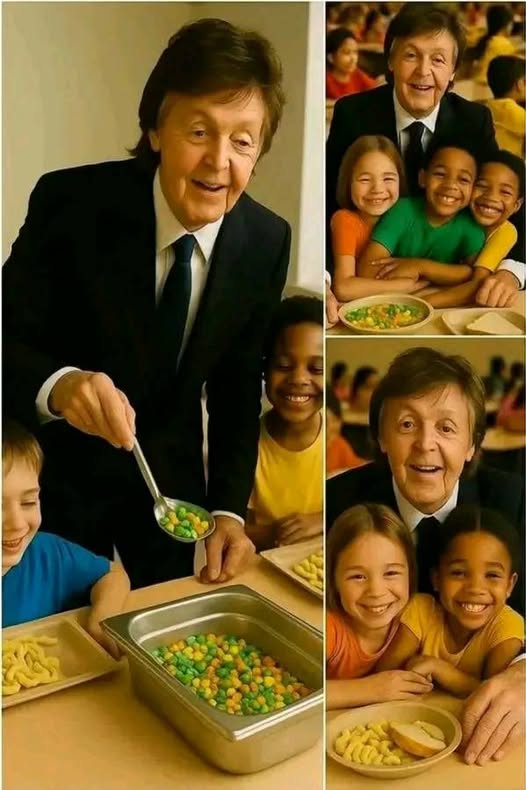🎼 A Legend Not Just in Music, But in Compassion
He’s known across the globe as one of the greatest songwriters of all time — a Beatle, a trailblazer, a knight of melody. But Paul McCartney’s legacy is not only written in platinum records or chart-topping hits. Sometimes, it’s inscribed in the silence of a warm meal and the gratitude of children who needed it most.
In an act as touching as his most heartfelt lyrics, Paul McCartney built a free canteen for 1,200 orphans, a quiet yet profound gesture that showcases the soul behind the songs.
While the world often celebrates his influence on pop culture, few realize the depth of his humanitarian spirit, especially in how it quietly touches lives far from the spotlight.
🍽️ 1,200 Meals, 1,200 Reasons to Believe in Good
The canteen wasn’t a publicity stunt. It wasn’t tied to a new album release, a charity concert, or a documentary. It was simply a reflection of Paul’s deep personal values, shaped by years of fame, loss, love, and resilience.
Built for a school housing and educating orphaned children, the canteen provides daily meals for 1,200 young hearts — many of whom have never known security or parental love. But in that space, they receive something nourishing not just for their bodies, but for their dignity.
It’s a space filled with laughter, music, warmth — and above all, hope.
✍️ Words That Fed Souls Before the Food Did
Before the first spoon touched a bowl, Paul McCartney left behind something even more profound — words.
His dedication letter, read aloud at the canteen’s opening ceremony, moved every student and teacher to tears. Described by one school official as “the most beautiful piece of writing ever to grace our walls”, the letter spoke of unity, courage, and the belief that “no child should ever go hungry in silence.”
Those words are now framed in the school’s main hall — etched into the collective memory of those who walk its halls every day. His music may have shaped generations, but here, his words became a warm blanket around aching souls.
🎸 From Liverpool to the Lives of the Forgotten
It’s easy to forget that Paul’s own childhood wasn’t free from hardship. Born during WWII, raised in modest conditions in Liverpool, he lost his mother at a young age. That early exposure to grief and perseverance shaped his emotional depth — the same depth that gave us “Let It Be,” “Blackbird,” and “Hey Jude.”
Perhaps that’s why he feels so connected to the vulnerable. He knows what it’s like to long for comfort. To crave stability. And now, decades later, he’s become the very person he once needed — for a new generation of children with no names in the headlines.
📚 A Ripple Through the Classroom
Teachers at the school speak of a subtle but powerful transformation in the students. Since the canteen opened, attendance has gone up. Energy has returned. Grades are improving. The staff call it “The McCartney Effect.”
One teacher shared, “It’s not just the meals. It’s the fact that someone like him — someone they’ll probably never meet — cared enough to see them, to feed them, to write to them. That changes a child.”
And indeed, it does.

Because while the world may know Paul McCartney for his music, these children will forever know him as the man who made them feel full — in every sense of the word.
🌍 A Life of Giving, Not Just Living
This isn’t the first time Paul has extended his hand beyond the stage. His animal rights activism, environmental work, and quiet support for educational causes are proof of a man who never stopped creating — not just songs, but change.
Yet, what sets this act apart is its deliberate anonymity. No red carpet. No news conference. Just generosity in its most raw and human form.
He once said in an interview, “If I can’t make the world better with the gifts I’ve been given, what’s the point of having them?” And with each meal served in that canteen, we’re reminded: he meant it.
💬 Social Media Echoes: When Kindness Goes Viral
Though Paul didn’t publicize the canteen, word spread — as it always does when love leaves a mark. Teachers and students began sharing heartfelt stories on social media. One post read:
“Paul McCartney didn’t just feed us today. He fed our belief that we matter.”
Fans responded with awe and pride. Artists were inspired to give back. Nonprofits referenced the canteen as a model of sustainable, silent philanthropy. In an age of digital noise, this quiet act rang louder than a thousand hashtags.
🕊️ A Legacy That Sings Louder Than Any Encore
When the history of Paul McCartney is finally written — not just as a Beatle, but as a man — let it include this moment. Let it include the story of a songsmith who also stitched hearts, who gave without cameras, who wrote with kindness when no one was watching.
Because in that canteen, he composed something no studio could produce — a symphony of generosity, humility, and human connection.
And that might just be his greatest composition of all.
💡 Closing Reflection
In a world obsessed with visibility, Paul McCartney chose invisibility. In an industry built on applause, he chose quiet grace. And in a time where power often forgets the powerless, he remembered.
Not with a song. Not with a stadium.
But with a canteen.


